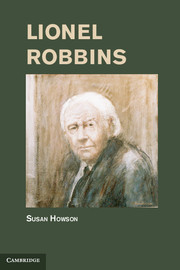Book contents
- Frontmatter
- Contents
- Illustrations
- Abbreviations
- Introduction
- One Father and Son
- Two The Great War
- Three Postwar
- Four The London School of Economics
- Five Iris Gardiner
- Six New College Oxford
- Seven The Young Professor
- Eight Fritz and Lionel
- Nine The School in the Mid-1930s
- Ten The Approach of War
- Eleven The Economics of War
- Twelve Director of the Economic Section
- Thirteen Anglo-American Conversations
- Fourteen The Law Mission and the Steering Committee
- Fifteen 1 9 4 4
- Sixteen The Last Months of the War
- Seventeen The Postwar Settlement
- Eighteen Return to the School
- Nineteen The End of the Transition
- Twenty LSE in the Early 1950s
- Twenty-One Chairman of the National Gallery
- Twenty-two Lord Robbins
- Twenty-three The Robbins Report
- Twenty-four The Sixties
- Twenty-five The Arts
- Twenty-six The Troubles at LSE
- Twenty-seven Retirement
- Conclusion
- Bibliography
- Index
Twelve - Director of the Economic Section
Published online by Cambridge University Press: 07 October 2011
- Frontmatter
- Contents
- Illustrations
- Abbreviations
- Introduction
- One Father and Son
- Two The Great War
- Three Postwar
- Four The London School of Economics
- Five Iris Gardiner
- Six New College Oxford
- Seven The Young Professor
- Eight Fritz and Lionel
- Nine The School in the Mid-1930s
- Ten The Approach of War
- Eleven The Economics of War
- Twelve Director of the Economic Section
- Thirteen Anglo-American Conversations
- Fourteen The Law Mission and the Steering Committee
- Fifteen 1 9 4 4
- Sixteen The Last Months of the War
- Seventeen The Postwar Settlement
- Eighteen Return to the School
- Nineteen The End of the Transition
- Twenty LSE in the Early 1950s
- Twenty-One Chairman of the National Gallery
- Twenty-two Lord Robbins
- Twenty-three The Robbins Report
- Twenty-four The Sixties
- Twenty-five The Arts
- Twenty-six The Troubles at LSE
- Twenty-seven Retirement
- Conclusion
- Bibliography
- Index
Summary
With the war economy essentially organized in the summer of 1941 several members of the Economic Section moved on. Cairncross was the first to leave, transferring to the Board of Trade in June and following Jewkes to the Ministry of Aircraft Production later in the year. Churchill had set up the Ministry of Aircraft Production in May 1940 under his friend the Canadian newspaper owner Lord Beaverbrook. When Beaverbrook left a year later the Permanent Secretary asked Jewkes and Chester to prepare a report on the planning of aircraft production – with the result that Jewkes was asked to set up a planning department in that ministry. When he moved in September Lionel took over his duties as head of the Section (Cairncross 1998, 86).
On 2 November Lionel told his sister Caroline that his new job was ‘enthrallingly interesting’: ‘It isn't exactly new but it’s more responsible. The man who was head of our section has moved on for the time being & while he is away I am looking after the show. This means almost daily contact with the formation of high policy in the sphere in which we are working & although the work is hard & the hours long, it is all so absorbing that I could hardly wish for a more satisfying position.…Of course in many ways it is narrowing.…I live move & have my being in this atmosphere of war administration, obsessed like a young man in love.’
- Type
- Chapter
- Information
- Lionel Robbins , pp. 387 - 423Publisher: Cambridge University PressPrint publication year: 2011

